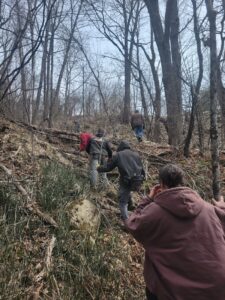Who is a member?
Our members are the local governments of Massachusetts and their elected and appointed leadership.

Project partners tour the proposed educational forest site in Windsor on April 2.
The image that comes to mind when picturing a landfill is not one full of nature, birdsongs, or trees reaching to the sky. An old landfill in Windsor is challenging these pre-conceived images, as it is poised to start a new life as an educational forest.
Windsor opened an unlined landfill on 100 acres of town land near the Windsor-Cummington line in the late 1960s, and closed it in 1989, when the town opened a new transfer station on the same property and the forest began the process of reclaiming the former dumpsite.
Today, the former landfill is a thriving forest. Recent tests using groundwater monitoring wells installed in 1999 by the Massachusetts Department of Environmental Protection reveal no evidence of leakage from the landfill.
Windsor used funds from the state’s Municipal Vulnerability Preparedness grant program to develop its educational forest plan.
“Our ‘naturally capped’ landfill is unique in that traditionally capping the site would now require at least the 3 acres of surrounding forest to be torn out and re-covered,” Liz Lounsbury, core team coordinator for the second round of Windsor’s MVP grant, also known as MVP 2.0, said in a prepared statement.
The core team consists of town staff, board and committee members, and Windsor residents with relevant experience.
Windsor received $95,000 in grant funding through MVP 2.0 to revisit previously established climate resilience priorities from the first round of MVP funding. As the town had already addressed these priorities, the MVP core team evaluated progress on those priorities while looking at future challenges and opportunities.
The town worked with the Collins Center at UMass Boston to identify a population within the community that would be most affected by climate change, and a seed project that would help to meet that population’s climate needs. After an extensive community and project partner engagement process, Windsor determined that the town’s younger residents would be most impacted by climate change, and educating these community members on climate change will be critical to Windsor’s climate resilience.
The educational forest will provide research opportunities for schools and universities within the region, with plans to develop an ongoing climate change mitigation education program for locals.
“It is our hope that educating people to be good stewards of our environment and resources will change individual behaviors,” Lounsbury said.
When finished, the educational forest will have three key components: a shelter with solar-powered lighting, storage and parking spaces, a trail between the shelter and the transfer station, and the forest itself, with points of interest, signage, and trails. The MVP core team expects project benchmarks to be complete by fall 2025.
A board of trustees will be responsible for programming and space usage within the forest.
Windsor hired a forester to develop a stewardship plan that assesses existing plant and animal species on the property, future climate change impacts to the forest, and mitigation strategies for those impacts.
The MVP core team’s goal is for the educational forest “to be an example of how communities can grow beyond the human impact on the land that had been overlooked for several centuries,” Lounsbury said.
“The forest is an extension of community members’ desires to enjoy the wooded environment for all its beauty and wonder for many years into the future,” Lounsbury said. “We hope that our testing and research availability for the naturally capped landfill and surrounding forest will become a guideline for communities with similar closed landfill situations to safely keep their surrounding habitats pristine.”